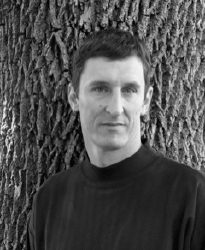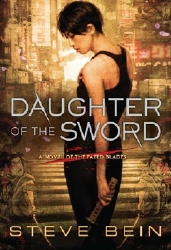
I spent the weekend at Capclave, a very enjoyable convention with a special place in its heart for small press publishing. Good people, good panels, good parties. It really seems a shame for it to end, but Monday has dawned and I’m back home. Of course one thing that makes the transition a bit easier is the weekly installment of EATING AUTHORS.
Our guest today is Steve Bein, whose first novel, Daughter of the Sword, came out less than two weeks ago.
Steve’s publicist has had him on a blog tour since then, so I wouldn’t be surprised if you’ve already seen the highlights of his C.V., but for those among you who haven’t let me just say that he holds a Ph.D. in philosophy and teaches Asian philosophy and Asian history, as well as the occasional course in science fiction. He dabbles in various martial arts (more than twenty, or so I’ve heard), enjoys rock climbing, scuba diving, skiing, and apparently most outdoorsy activities. He’s probably been up for hours doing something athletic before this post even appeared on the blog (whereas I am sleeping in, and blaming it on a weekend of convention over-indulgence).

LMS: Welcome, Steve. You know why you’re here, right? Please tell the nice readers about your most memorable meal.
SB: The two best meals I’ve ever had were both in Japan. Both were delicious, but the most memorable was the one that told me the most about Japanese culture.
This was in Machida, a suburb on the outskirts of Tokyo. I’d been there for about a year as a research student, and my academic advisor, Megumi Sakabe, decided he’d take me out for dinner before I flew home. This was a doubly special occasion: first, it was my last night in Japan; second, Dr. Sakabe was very nearly a case of karÅshi, or “death from overwork.†He’d literally worked so hard and so relentlessly that it almost killed him, and his doctor basically put him on house arrest, strictly forbidding him from teaching or research for a year. This was just before I arrived in Machida, and in typical fashion for men of his generation, Dr. Sakabe never forgave himself for “abandoning me.â€
Of course I’d hardly been abandoned, but Dr. Sakabe was most insistent, and so there we were, at the finest seafood restaurant in Machida. The space itself was amazing: very sleek, very modern décor, taking the oldest Japanese dining traditions as its theme. The waitresses wore traditional kimonos and the floors were tatami, but otherwise the restaurant looked like something out of the pages of Dwell.
In Japan fine dining can take well over an hour, and we were about to tuck in to a twelve-course meal. We’re talking very subtle cuisine: for example, the soup changes flavor as you let it cool. They time everything they serve so that the flavors and temperatures are meeting at just the right moment. And as I said, this was a seafood place, which meant the catch of the day came with a catch: I’m a vegetarian.
Dr. Sakabe explained this very politely to our kimono-clad waitress. She very politely asked a couple of questions to clarify the situation, then said she’d bring it up to the chef. To her credit she chose not to ask, Why on earth did you bring this kid here, where he won’t eat anything?
The only one who isn’t being polite here is me. Once Dr. Sakabe chose a restaurant, the proper thing for me to do as his student would have been to put my vegetarianism on hold, at least for the space of a meal. Now embarrassment is looming on the horizon. Dr. Sakabe can’t just have us get up and leave. That sort of thing isn’t done. And the waitress can’t very well tell us that they have no food for me. That would insult the restaurant and Dr. Sakabe.
Instead, the waitress comes back and tells us the chef will do something with tofu for me. Now I’ve really gone and stuck my foot in it. Dr. Sakabe’s dinner is going to be a dozen courses long. I’m going to have my one plate of tofu and then a very long and very awkward wait.
Or so I thought. I never could have predicted what came next. The chef invented twelve tofu and vegetable courses me, all of them unique, all of them whipped up on the spot. Savory, spicy, crispy, soft, succulent, sweet—he even did a tofu dessert. None of it was on the menu. It was as if he’d taken my vegetarianism as a challenge, like a samurai proving his mettle against a foe who called him out on the battlefield. If so, he was as valorous a chef as any who ever lived, and as generous a host as you’re ever likely to find. What a sendoff! I got on the plane the next day as a very happy boy.

Thanks, Steve, and congratulations on the new book! As for the tofu, well, you’re on your own there. I admire your conviction to your vegetarian ideals, but that chef is surely the real hero of the story.
Next Monday: Another author and another meal!
Tags: Eating Authors

